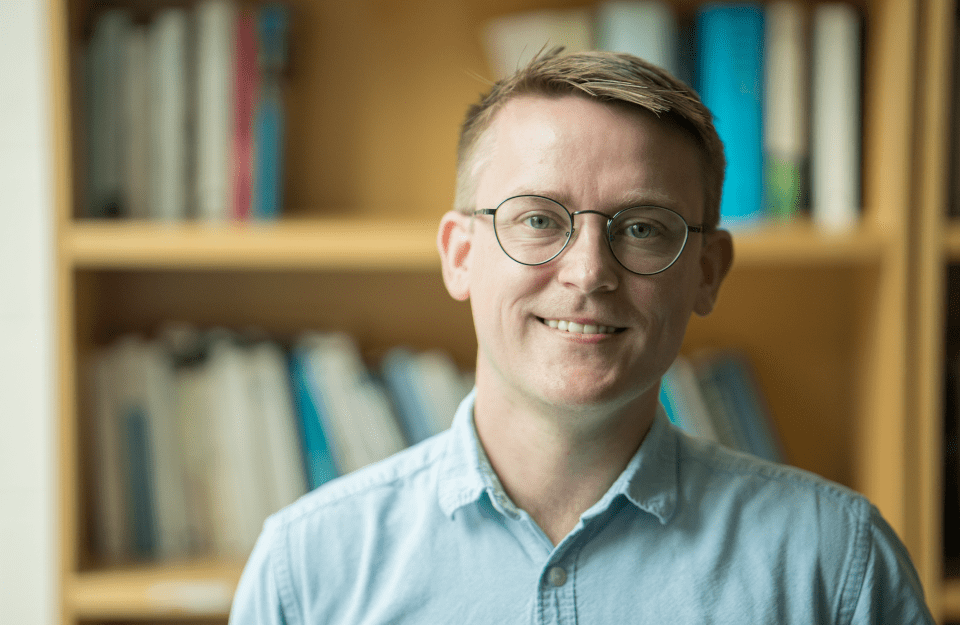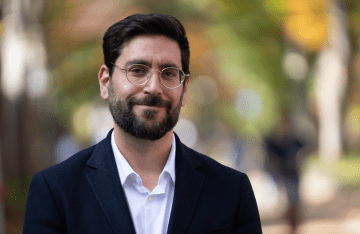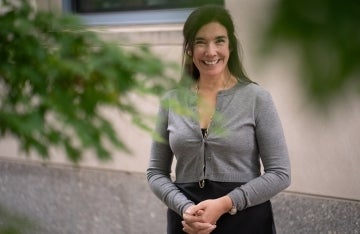Health Communication Scholar David Lydon-Staley Promoted to Associate Professor with Tenure
In this Q&A, Lydon-Staley discusses his research, teaching, and what’s next.

Professor David Lydon-Staley was recently promoted to Associate Professor and received tenure at the Annenberg School for Communication at the University of Pennsylvania.
A scholar of health communication, Lydon-Staley’s work focuses on moment-to-moment and day-to-day fluctuations in brain, behavior, and interpersonal and media environments to provide insight into substance use, emotion dynamics, and curiosity across the human lifespan. He leads the Addiction, Health, & Adolescence (AHA!) Lab at Annenberg.
On the occasion of this momentous milestone in his academic career, we asked him a few questions about his five years at the Annenberg School and what his research, teaching, and mentorship look like now.
How has your research evolved since you joined the Annenberg faculty in 2020?
As a developmental scientist by training, my research focuses on the interplay between biological, psychological, and environmental layers of human experience. Since joining Annenberg, I like to think that my treatment of the environmental layer — particularly the media environments people inhabit — has become more nuanced. Drawing on insights from the field of Communication, my research on curiosity has evolved from foundational questions about what curiosity is and how it is practiced to more applied investigations of how people engage with online environments in their search for health information, for example. My research on emotion dynamics in everyday life now takes media exposure seriously, examining it both as a driver and a consequence of emotional fluctuations. I’m also extending this work into the neuroimaging space by incorporating complex media stimuli, such as film clips, to better understand brain dynamics during cognitively and emotionally engaging moments.
You lead the Addiction, Health, & Adolescence (AHA!) Lab at Annenberg. What kinds of issues are group members studying right now?
Our lab is exploring a range of questions at the intersection of curiosity, health, and the environment. Nidah Mohammed is extending our curiosity work into the realm of creativity. She’s collaborating with Philadelphia artist Rebecca Kamen, a regular partner of the lab, to explore the role curiosity plays in artistic creation. Thandi Lyew is examining how curiosity may be undermined by an individual’s difficulty tolerating uncertainty. Ben Muzekari is working with data from an NIH-funded study of people who smoke cigarettes. He’s investigating whether adopting a curious mindset about withdrawal symptoms can lessen their intensity and duration in daily life. Collin Kather is also working with these data and integrating environmental context, such as daily air pollution, to ask how everyday exposures shape smoking behavior. And our lab’s newly-minted Ph.D., Dr. Xinyi Wang, is wrapping up exciting work showing how social cues, that indicate what other people find interesting, can boost curiosity for new information.
What are some of the research projects you’re planning to pursue now that you have tenure?
Now that I have tenure, I’m taking time to step back and think about the big questions I’d like to tackle next. I’m increasingly interested in how curiosity functions in social contexts. For example, how much of what we choose to read is shaped by recommendations from friends, by the desire to have something engaging to talk about around the dinner table, versus the pursuit of what fascinates us on our own terms? I’m also eager to explore bridges between my academic research and my fiction writing. Lately, I’ve been thinking about the narrative strategies writers use to spark curiosity in readers and how readers respond to these cues.
How do you approach working with students, including teaching and mentorship?
A tenet of developmental science that guides all my work is the idea that “behavior is the leading edge of adaptation.” In simpler terms, we grow and change most through what we do. This belief shapes both my teaching and mentorship. In the lab, students are active contributors from the start, diving directly into research design, analysis, and interpretation. In the classroom, I emphasize hands-on learning – many of my courses include a data lab component where students engage directly with real data as they learn statistical concepts. Across all my courses, writing is central: students gradually build their abilities to articulate their ideas on the page and to revise in response to feedback.
You recently received a master’s degree in creative writing, wrote a novel, and obtained a literary agent. How is pitching your book to publishers going?
I have no idea! One of the great things about having a wonderful agent is that I don’t have to think too much about the submission process myself. While he’s doing the difficult work of trying to find a home for my first novel, I’m focused on writing my second – my love letter to queer intergenerational friendship.



